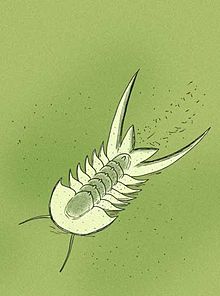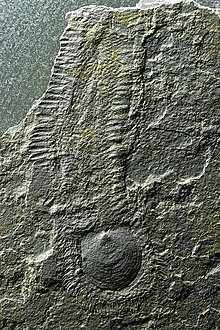Sirius Passet
| Sirius Passet | |
|---|---|
| Stratigraphic range: Cambrian Series 2 ~ | |
 Halkieria evangelista, an iconic fossil of the Sirius Passet | |
| Type | Geological formation |
| Lithology | |
| Primary | Mudstone |
| Location | |
| Coordinates | 82°47.6′N 42°13.7′W / 82.7933°N 42.2283°W |
| Region | Northern Greenland |
| Country | |
| Type section | |
| Named for | Sirius sledge patrol |
| Named by | A. Higgins |
| Location | J.P. Koch Fjord |
| Year defined | 1987 |
| Coordinates | 82°47.6′N 42°13.7′W / 82.7933°N 42.2283°W |
| Country | |
 Geologic Map with the Buen and the Portfjeld formations, and the Polkorridoren Group. | |
Sirius Passet is a Cambrian Lagerstätte in Peary Land, Greenland. The Sirius Passet Lagerstätte was named after the Sirius sledge patrol that operates in North Greenland. It comprises six places in Nansen Land, on the east shore of J.P. Koch Fjord in the far north of Greenland.[1] It was discovered in 1984 by A. Higgins of the Geological Survey of Greenland. A preliminary account was published by Simon Conway Morris and others in 1987 and expeditions led by J. S. Peel and Conway Morris have returned to the site several times between 1989 and the present. A field collection of perhaps 10,000 fossil specimens has been amassed. It is a part of the Buen Formation.
Age
[edit]
The fauna is inevitably compared to that of the Burgess Shale, although it is probably ten to fifteen million years older – 518 million years ago vs. 508 million years ago[2]) – and more closely contemporaneous with the fauna of the Maotianshan shales from Chengjiang, which are dated to 518 million years ago.
Preservation
[edit]The preservation of the Sirius Passet is traditionally considered to represent silicification associated with a death mask,[3] recalling the 'Ediacara-type' preservation of the Precambrian Ediacara biota.[4] A 2022 study suggested that the original preservation mode was phosphatisation that was later altered by low-grade metamorphism with a peak temperature of 409 ± 50 °C (768 ± 90 °F) during the Devonian Ellesmerian orogeny, which resulted in widespread mineral replacement.[5]
Geochemical analysis indicates that the fossils lived close to the boundary of an oxygen minimum zone, possibly being preserved in oxygen-starved periods.[6]
IUGS geological heritage site
[edit]In respect of the importance of the exceptionally preserved fossils in our understanding of the event, the 'Cambrian Explosion in Sirius Passet' was included by the International Union of Geological Sciences (IUGS) in its assemblage of 100 'geological heritage sites' around the world in a listing published in October 2022. The organisation defines an 'IUGS Geological Heritage Site' as 'a key place with geological elements and/or processes of international scientific relevance, used as a reference, and/or with a substantial contribution to the development of geological sciences through history.'[7]
Fauna
[edit]Although the fauna has not yet been fully described, it is known to consist of a moderate number of arthropods and sponges, and rare representatives of other groups. It has yielded the problematic taxon Halkieria, and the Panarthropods Kerygmachela and Pambdelurion, all of which have played prominent roles in discussions about the origins of the modern animal phyla.
Taxa from the Sirius Passet fauna
[edit]After[8]
Arthropods
[edit]| Arthropods | |||
|---|---|---|---|
| Genus | Species | Notes | Images |
| Aaveqaspis[9] | A. inesoni | An arthropod of uncertain affinitiies |  |
| Arthroaspis | A. bergstroemi | A member of Artiopoda |  |
| Buenaspis | B. forteyi | A nektaspid artiopod |  |
| Buenellus | B. higginsi | A trilobite | |
| Campanamuta | C. mantoni | An artiopod |  |
| Kleptothule | K. rasmusseni | A trilobite |  |
| Molaria | M. steini | An artiopod | |
| Sidneyia? | Indeterminate | A vicissicaudatan artiopod, later authors have stated that the assignment to the genus is equivocal.[10] |  |
| Thulaspis | T. tholops | A basal artiopodan closely related to Squamacula. |  |
| Siriocaris | S. trollae | A possible member of Lamellipedia | |
| Isoxys | I. volucris, I. sp | A bivalved, freely swimming arthropod |  |
| Kiisortoqia | K. soperi | A basal arthropod with large frontal appendages |  |
| Kerygmachela | K. kierkegaardi | A "gilled lobopodian" closely related to arthropods | 
|
| Pambdelurion | P. whittingtoni | A "gilled lobopodian" closely related to arthropods |  |
| Tamisiocaris | T. borealis | A filter feeding radiodont |  |
| Amplectobeluidae[11] | Indeterminate | Predatory radiodont | |
| Pauloterminus | P. spinodorsalis | A shrimp-like arthropod, possibly a member of Hymenocarina |  |
Other animals
[edit]| Non-arthropod animals | ||||
|---|---|---|---|---|
| Genus | Species | Notes | Images | |
| Ooedigera[12] | O. peeli | A vetulicolian, another indeterminate vetulicolian is also present |  | |
| Chordata[11] | Indeterminate | Vertebrate-like chordate | ||
| Hadranax | H. augustus | A lobopodian |  | |
| Halkieria | H. evangelista | A basal mollusc |  | |
| Xystoscolex | X. boreogyrus | A palaeoscolecid worm |  | |
| Chalazoscolex | C. pharkus | A palaeoscolecid worm |  | |
| Timorebestia[11] | T. koprii | A giant stem-group chaetognath |  |
|
| Chaetognatha[11] | Indeterminate | Small-sized form | ||
| Pygocirrus | P. butyricampum | An annelid worm |  | |
| Phragmochaeta[13] | P. canicularis | A polychaete worm |  | |
| Singuuriqia | S. simony | A priapulid worm | ||
| Sirilorica | S. carlsbergi, S. pustulosa | a stem-group Loricifera or a scalidophoran | ||
| Hyolithus | H. cf. tenuis | A hyolith | ||
| Trapezovitus | Indeterminate | |||
| Orthothecida | ||||
| Hyolithida | ||||
| Archaeocyatha | Indeterminate | A sponge | ||
| Choia | C. cf. carteri | A sponge | ||
| Constellatispongia | C. canismajorii | A sponge | ||
| Crassicoactum | C. cucumis | A sponge | ||
| Demospongiae | Indeterminate | A sponge | ||
| Fieldospongia | F. bellineata | A sponge | ||
| Hamptonia | H. limatula | A sponge | ||
| Lenica | L. cf. unica L. hindei, L. perverse | A sponge | ||
| Saetaspongia | S. cf. densa S. procera | A sponge | ||
| Salactiniella | S. cf. plumata | A sponge | ||
| Stephanella? | Indeterminate | A sponge | ||
See also
[edit]References
[edit]- ^ Peel, J. S.; Ineson, J. R. (2011). "The extent of the Sirius Passet Lagerstätte (early Cambrian) of North Greenland". Bulletin of Geosciences: 535–543. doi:10.3140/bull.geosci.1269.
- ^ Stein, Martin (March 2010). "A new arthropod from the Early Cambrian of North Greenland, with a 'great appendage'-like antennula". Zoological Journal of the Linnean Society. 158 (3): 477–500. doi:10.1111/j.1096-3642.2009.00562.x.
- ^ Strang, Katie M.; Armstrong, Howard A.; Harper, David A. T.; Trabucho-Alexandre, João P. (2016). "The Sirius Passet Lagerstätte: Silica death masking opens the window on the earliest matground community of the Cambrian explosion". Lethaia. 49 (4): 631–643. doi:10.1111/let.12174.
- ^ Tarhan, LG; Hood, A V. S; Droser, ML; Gehling, JG; Briggs, DEG (2016). "Exceptional preservation of soft-bodied Ediacara Biota promoted by silica-rich oceans". Geology. 44 (11): G38542.1. Bibcode:2016Geo....44..951T. doi:10.1130/G38542.1.
- ^ Nielsen, Morten Lunde; Lee, Mirinae; Ng, Hong Chin; Rushton, Jeremy C.; Hendry, Katharine R.; Kihm, Ji-Hoon; Nielsen, Arne T.; Park, Tae-Yoon S.; Vinther, Jakob; Wilby, Philip R. (2022-01-01). "Metamorphism obscures primary taphonomic pathways in the early Cambrian Sirius Passet Lagerstätte, North Greenland". Geology. 50 (1): 4–9. Bibcode:2022Geo....50....4N. doi:10.1130/G48906.1. ISSN 0091-7613.
- ^ Hammarlund, Emma U.; Smith, M. Paul; Rasmussen, Jan A.; Nielsen, Arne T.; Canfield, Donald E.; Harper, David A. T. (2019). "The Sirius Passet Lagerstätte of North Greenland-A geochemical window on early Cambrian low-oxygen environments and ecosystems". Geobiology. 17 (1): 12–26. doi:10.1111/gbi.12315. PMC 6586032. PMID 30264482.
- ^ "The First 100 IUGS Geological Heritage Sites" (PDF). IUGS International Commission on Geoheritage. IUGS. Retrieved 10 November 2022.
- ^ Harper, David A. T.; Hammarlund, Emma U.; Topper, Timothy P.; Nielsen, Arne T.; Rasmussen, Jan A.; Park, Tae-Yoon S.; Smith, M. Paul (2019). "The Sirius Passet Lagerstätte of North Greenland: a remote window on the Cambrian Explosion". Journal of the Geological Society. 176 (6): 1023–1037. doi:10.1144/jgs2019-043. ISSN 0016-7649.
- ^ Peel, J.S.; Stein, M. "A new Arthropod from the Lower Cambrian Sirius Passet Fossil-Lagerstätten of North Greenland" (PDF). Bulletin of Geosciences. 84 (4): 1158.
- ^ Sun, Zhixin; Zeng, Han; Zhao, Fangchen (March 2020). "First occurrence of the Cambrian arthropod Sidneyia Walcott, 1911 outside of Laurentia". Geological Magazine. 157 (3): 405–410. doi:10.1017/S0016756819000864. ISSN 0016-7568.
- ^ a b c d Park, Tae-Yoon S.; Nielsen, Morten Lunde; Parry, Luke A.; Sørensen, Martin Vinther; Lee, Mirinae; Kihm, Ji-Hoon; Ahn, Inhye; Park, Changkun; de Vivo, Giacinto; Smith, M. Paul; Harper, David A. T.; Nielsen, Arne T.; Vinther, Jakob (2024-01-05). "A giant stem-group chaetognath". Science Advances. 10 (1). doi:10.1126/sciadv.adi6678. ISSN 2375-2548. PMC 10796117.
- ^ Vinther, J.; Smith, M. P.; Harper, D. A. T. (2011). "Vetulicolians from the Lower Cambrian Sirius Passet Lagerstätte, North Greenland, and the polarity of morphological characters in basal deuterostomes". Palaeontology. 54 (3): 711–719. doi:10.1111/j.1475-4983.2011.01034.x. S2CID 85602402.
- ^ Conway Morris, S.; Peel, J. S. (2008). "The Earliest Annelids: Lower Cambrian Polychaetes from the Sirius Passet Lagerstätte, Peary Land, North Greenland". Acta Palaeontologica Polonica. 53: 137–148. doi:10.4202/app.2008.0110.
Further reading
[edit]- Martin, M.W.; Grazhdankin, D.V.; Bowring, S.A.; Evans, D.A.D.; Fedonkin, M.A.; Kirschvink, J.L. (2000). "Age of Neoproterozoic Bilaterian Body and Trace Fossils, White Sea, Russia: Implications for Metazoan Evolution". Science. 288 (5467): 841–845. Bibcode:2000Sci...288..841M. doi:10.1126/science.288.5467.841. PMID 10797002.
- Harper, D. A. T.; Hammarlund, E. U.; Topper, T. P.; Nielsen, A. T.; Rasmussen, J. A.; Park, T.-Y. S.; Smith, M. P. (2019). "The Sirius Passet Lagerstätte of North Greenland: a remote window on the Cambrian Explosion". Journal of the Geological Society. 176 (6): 1023–1037. Bibcode:2019JGSoc.176.1023H. doi:10.1144/jgs2019-043. S2CID 198424068.
